Mitchell fig tree

Mitchell Jay Feigenbaum (born December 19, 1944 in Philadelphia , Pennsylvania , † June 30, 2019 in New York City ) was an American physicist and pioneer in chaos research . He is considered to be the discoverer of the universality of period doubling.
Life
The son of Jewish immigrants from Poland and Ukraine grew up in the Brooklyn neighborhood of New York City . His father Abraham Joseph Feigenbaum was a chemist and his mother Mildred Sugar a teacher. He attended Samuel J. Tilden High School and the City College of New York , where he studied electrical engineering from 1960 to 1964 . He received his PhD from the Massachusetts Institute of Technology in 1970 for his work in the field of elementary particle physics . Feigenbaum spent the next four years at Cornell University and the Virginia Polytechnic Institute (1972 to 1974) with no success . Unsuccessful because he did not produce the publications necessary for young scientists. When asked by his supervisors what about a particular problem, he replied "Oh, I got it."
In 1974 Feigenbaum moved to the Los Alamos National Laboratory and investigated turbulence , especially in liquids. The research group in which he worked could not find an explanatory theory in this area, but Feigenbaum used this research to study chaotic functions .
Many mathematical functions, which are based on a single linear parameter , show apparently random courses, also known as chaos, when the parameter is within a certain range. When the parameter approaches this range, the function shows a branching or bifurcation at certain values of the parameter. Initially there is only one stable point, then the function oscillates between two points, later four and so on. In 1975 Feigenbaum discovered with the help of his HP-65 (the first programmable pocket calculator) that the ratio of the difference between the values of successive period doublings has a constant of 4.6692016090. He was then able to provide the mathematical proof of this phenomenon and showed that a large number of mathematical functions exhibit the same behavior and the same constant shortly before the onset of chaos. With the help of this universal constant, it was possible for researchers for the first time to investigate the random behavior of chaotic systems. It is known today as the fig tree constant .
Feigenbaum was also responsible for the introduction of new fractal methods in cartography , which made it possible to draw scalable maps of coastlines, borders and mountain ranges with the help of computers .
In 1982 he became a professor at Cornell University , received a MacArthur Fellowship in 1984 and the Wolf Prize in Physics in 1986 with Albert Libchaber and in 1987 the Dickson Prize in Science . Since 1986 he has been a professor at Rockefeller University and director of the Center for Studies in Physics and Biology there.
In 1978 and 1984 he was at the Institute for Advanced Study and in 1980/81 at IHES .
He was a member of the National Academy of Sciences (1988), the American Physical Society and the American Academy of Arts and Sciences (1987).
Since 2017, Clarivate Analytics has counted him among the favorites for a Nobel Prize in Physics ( Clarivate Citation Laureates , formerly Thomson Reuters Citation Laureates ) due to the number of his citations .
Fonts
- Quantitative Universality for a class of nonlinear transformations, Journal of Statistical Physics, Volume 19, 1978, pp. 25-52
- The universal metric properties of nonlinear transformations, Journal of Statistical Physics, Volume 21, 1979, pp. 669-706
- Universal behavior in nonlinear systems, Los Alamos Science, Volume 1, 1980, pp. 4-27 (reprinted in H. Bai-Lin, Chaos, Volume 1, World Scientific 1984)
- The transition to aperiodic behavior in turbulent systems, Comm. Math. Phys., Vol. 77, 1980, pp. 65-86
- Presentation functions, fixed points and a theory of scaling function dynamics, Journal of Statistical Physics, Volume 52, 1988, pp. 527-568
- with Leo Kadanoff , Scott Shenker : Quasiperiodicity in dissipative systems: a renormalization group analysis, Physica D, Volume 5, 1982, pp 370-386
Individual evidence
- ↑ Mitchell Feigenbaum, physicist who pioneered chaos theory, has died , The Rockefeller University , accessed July 4, 2019
- ↑ James Gleick: Chaos. The Amazing Science of the Unpredictable , 1998, Vintage Random House, London, pp. 159-160 ISBN 0-7493-8606-1
- ↑ Mitchell J. Feigenbaum. John D. and Catherine T. MacArthur Foundation, accessed July 8, 2019 .
- ↑ The 2017 Clarivate Citation Laureates - Clarivate. (No longer available online.) In: clarivate.com. Archived from the original on September 20, 2017 ; accessed on September 21, 2017 . Info: The archive link was inserted automatically and has not yet been checked. Please check the original and archive link according to the instructions and then remove this notice.
Web links
- John J. O'Connor, Edmund F. Robertson : Mitchell Feigenbaum. In: MacTutor History of Mathematics archive .
- Homepage at Rockefeller University (English)
- Biography at the APS
| personal data | |
|---|---|
| SURNAME | Feigenbaum, Mitchell |
| ALTERNATIVE NAMES | Feigenbaum, Mitchell Jay (full name); Feigenbaum, Mitchell J. |
| BRIEF DESCRIPTION | American physicist and chaos researcher |
| DATE OF BIRTH | December 19, 1944 |
| PLACE OF BIRTH | Philadelphia , Pennsylvania |
| DATE OF DEATH | June 30, 2019 |
| Place of death | New York City |
